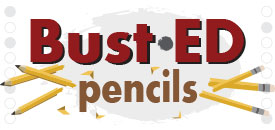
Published on June 20, 2019 in
Earth frowns. With a face of green and blue, the planet’s mood is blue, too — as unblinking eyes cast a somber stare.
Colored with crayons, this drawing is the schoolwork of Maya, a fifth grader from the United States. At the top sits a title: “Greenhouse Gas Effect.” Piercing Earth’s atmosphere, sharp arrows represent solar radiation, which for the most part remain trapped as heat by a ring of gases aptly shaded green. While a patchwork of flags from around the world makes for a vibrant backdrop, it can’t detract from the dismal mood. To punctuate the point with urgency, there’s a red explosion with all caps in black: “EXTREME!”
Kids like Maya are growing up in a world set to face the worst of climate change. As dire warnings pour out from research scientists and indigenous peoples around the globe, many U.S. teachers don’t mention our planet’s fever in the classroom — and think tanks and fossil fuel companies that deny the scientific consensus on climate promote junk lessons to instructors who do.
Continue reading
Published on February 26, 2019 in
This Black History Month has been packed with controversy, with scandals and headlines revolving around blackface dominating the national conversation. But some say the singular focus on blackface distracts from the larger issues — namely, how little is known about the nation’s deeply racist history, and what is — and isn’t — taught about the black American experience in the nation’s public schools. (
PDF)
Published on February 12, 2019 in
The future of labor unions is tenable not only because of political efforts to suppress them, but also because of pedagogical oppression. American schools are not teaching students about labor unions and their fight against economic injustice. Ask any young American what they know about labor unions, and you will likely get the same response. This points to a serious issue in the American school system, which tends to ignore the labor movement’s role in American history. (
PDF)
Published on December 14, 2018 in
The Zinn Education Project is a great resource, and has been on The Best Teacher Resource Sites For Social Justice Issues list [since] it began. They just unveiled a redesign and expansion of their website, and it looks great! One of the new features I’m most excited about is a complete and searchable “Today In History” page. It’s a great addition to The Best “Today In History” Sites.
Continue reading
Published on October 19, 2018 in
Squeezed between the devastation of the U.S. Civil War and the excesses of the Gilded Age, the pivotal era of Reconstruction doesn’t always get the attention it deserves in grade-school history classrooms.
Victoria Smalls wants to change that.
A veteran public historian who has worked for Charleston’s planned International African American Museum and Saint Helena Island’s Penn Center, Smalls recently became the first state campaign organizer for the Zinn Education Project’s Teach Reconstruction initiative.
Continue reading at The Post and Courier.
Published on March 8, 2018 in
The young woman in the black sweatshirt was indignant. Across the negotiating table, a stern, occasionally sharp-tongued adversary refused to budge — first on wages and now on the organization’s social media policy. “We’re a hospital,” said the woman with marked intensity. “Don’t you agree that our first responsibility is to our patients?”
A cluster of young people nearby hotly debated the fairness of random drug tests for employees. Over in a far corner, a third group traded opinions on whether to accept management’s proposal to offer new hires 401(k)s instead of pensions. “It’s just for new employees,” said one young man, clad in a purple T-shirt. “But we have to think about solidarity,” replied a young woman in clear-framed glasses.
Continue reading
Published on March 8, 2018 in
Students aren’t likely to learn much about the way that unions have shaped economic and social policy if they stick to traditional textbooks, according to a report by the Albert Shanker Institute, a pro-labor group named for a longtime leader of the American Federation of Teachers. The 2011 study of four popular textbooks on American history found that coverage of the labor movement was “narrow and sometimes seriously misleading.”
“Textbooks tend to be tilted to the perspectives of the Rockefellers and the du Ponts and the Morgans, and don’t do a fair job in terms of representing the conditions that working people were toiling under, or the often difficult struggles they had to engage in to establish basic rights,” says Leo Casey, the Shanker Institute’s executive director.
Continue reading








